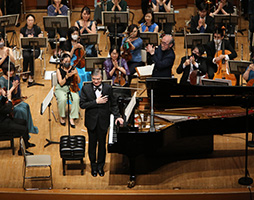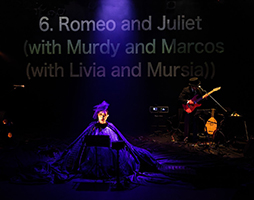No.sfa0053
2022/4/4
- Culture / Sports
“Orchestra Nipponica 38th Concert ”
“Opera《Romeo will juliet》World Premiere”
announced winning performances of the 21st Keizo Saji Prize for 2021
Download PDF
 |
 |
|
Orchestra Nipponica 38th Concert |
Opera《Romeo will juliet》World Premiere |
The Suntory Foundation for the Arts (Directors General: Tsuyoshi Tsutsumi and Shingo Torii) has announced that the 21st (2021) Keizo Saji Prize, bestowed on candidates selected from among those who gave predominantly music-based public performances held in Japan during the year, with winners chosen based on a willingness to challenge and on superior performances that engender a strong reaction, has been awarded to “Orchestra Nipponica 38th Concert” & “Opera《Romeo will juliet》World Premiere ”.
▽Selection process
A qualifying round was held on Saturday, February 12, 2022 by online to consider applicants who had given public performances in 2021. After careful consideration, “Orchestra Nipponica 38th Concert ” & “Opera《Romeo will juliet》World Premiere ”were chosen as the recipients of the 21st (2021) Keizo Saji Prize, a decision that received the formal agreement of the Board of Directors of the Foundation on Thursday, March 31, 2022.
▽Prize-money Total ¥2,000,000, ¥1,000,000 will be given for each.
▽The members of the selection committee
Seiji Choki, Atsuya Funaki, Nobuhiro Ito, Seiko Ito, Morihide Katayama, Mikako Mizuno, Yoshihiko Nonomura, Miyuki Shiraishi (In alphabetical order)
▽“Orchestra Nipponica 38th Concert ”
(Reason for the award)
Orchestra Nipponica’s “Teizo Matsumura Symphonic Works Exhibition” presented outstanding performances of the composer’s Piano Concerto No. 1 (1973), To the Night of Gethsemane (2002/2005) and Symphony No. 1 (1965), confronting our modern age with the thoughts and sensibilities of this master of the Showa period.
Though the dates the three works were composed are separated by years, and there is a gap in their respective grammar, one is not given the impression that Matsumura’s youthful energy of the 1960s and 70s is separate from the mature orchestration of Gethsemane. Working through the latter half of the Showa period, he remained acutely aware of the tactile sensation of Japan even while influenced by the Western European avant-garde. He continued to maintain a strong sense of individuality, establishing a worldview that went beyond his technique and leading to a divinely inspired writing style. That path was clearly revealed by Orchestra Nipponica under the baton of Ichiro Nodaira.
Structural uncertainty is replaced by individualistic, unique contrasts and figure associations. While relying on a French grammar, the orchestra is not in pursuit of resonance so much as in contrasting instrumentation along structural milestones, thus revealing the diversity of the orchestration in its original sense. In particular, Yasuo Watanabe’s stately solo in the Piano Concerto served as a unifying core, highlighting the work as a pioneer of the unique contemporary Japanese orchestration that dominated the 1980s and 90s.
Unlike sound creation today, which employs special performance techniques and the catabolism of overtones, the Symphony No. 1 uses so-called harmonized sounds, spun across time in ostinato; this performance revealed a special new dimension to this technique. The balance between instruments and the subtle accents within phrases created a texture that was never flat. Combined with conductor Nodaira’s own sense of timbre, this drew forth new shadings that brought out completely new impressions from Matsumura’s work.
The 38th Concert of Orchestra Nipponica, which dared to place the great legacy of the Showa period in the field of today’s acoustics and tackled the effort with a sense of challenge, brought out new value in the work and delivered a performance worthy of the Keizo Saji Prize.
(Mikako Mizuno, Committee Member)
(Outline)
Title:Orchestra Nipponica 38th Concert―Teizo Matsumura Symphonic Works Exhibition
Date:18th July 2021, 14:30
Venue:Kioi Hall, Chiyoda-ku, Tokyo
Program:Teizo Matsumura:
Piano Concerto No. 1 (1973)
To the Night of Gethsemane (2002/2005)
Symphony No. 1 (1965)
Artists:
Ichiro Nodaira, Conductor
Yasuo Watanabe, Piano
Orchestra Nipponica
Organized by Yasushi Akutagawa Memorial Orchestra Nipponica
▽“Opera《Romeo will juliet》World Premiere”
(Reason for the award)
The opera 《Romeo will Juliet》, with libretto and music by Tomomi Adachi and directed by Satoshi Ago, premiered with soloist Maki Ota (soprano) and Gaku Yamada (guitar). Adachi, himself a performer who uses his voice, body, self-made instruments and electronic devices in his performances, used AI trained in Shakespeare’s Romeo and Juliet to gather information about the original work from the internet and to generate a new text, which was then translated into Japanese to form the basic text of the opera. Through Adachi’s reshuffling of the work, this methodology resulted in a completely new libretto for the opera even as, in the end, it relied on the original work. This is similar to the literary and theatrical methods used by the likes of James Joyce and Heiner Müller, who adapted original works to create new texts, but filtered through modern media--namely AI and the internet. In that sense, this production--together with Ago’s direction, which references Beckett’s Happy Days and intersects with the image of underground theater--can be given a solid place in the history of stage creation as a contemporary piece that makes the most of Shakespeare’s work while reimagining it.
From the libretto, with its varied styles and loosely-knit, preposterous meanings, Ota used her versatile voice and vocal techniques to create a kaleidoscopic world of narration and song. Yamada, meanwhile, participated onstage, moving freely with superb technique between acoustic guitar, electric guitar and lute in response to Adachi’s music, which traversed avant-pop, Renaissance lute music, the latest guitar techniques and avant-garde methods. The overall stage effect of the two was overwhelming to all who saw or heard the performance.
This performance is recognized as worthy of being awarded the 2021 Saji Keizo Prize based on its achievement in bringing together an overview of today’s stage works from a variety of perspectives while engaging in new creation and outstanding performance. That said, the fresh approach to the works of Teizo Matsumura presented in the concert by Ichiro Nodaira and the Orchestra Nipponica was an achievement easily on par with this performance, which is why awards have been presented to both.
(Seiji Choki, Committee Member)
(Outline)
Title:Opera《Romeo will juliet》World Premiere-
Date:
5th November 2021, 19:00
6th November 2021, 14:00, 18:00
7th November 2021, 14:00
Venue:THEATRE E9 KYOTO, Minami-ku, Kyoto
Composer:Tomomi Adachi
Script:GPT-2(Original:William Shakespeare "Romeo and Juliet")
Director:Satoshi Ago
Artists:Maki Ota, Gaku Yamada
Program:
Romeo will juliet, opera for a soprano, a guitarist and electronic sounds
[World Premiere, Commissioned by Maki Ota & Gaku Yamada]
After Talk:
Adachi Tomomi (5th November)
Kojin Ota, Tetsuya Ozaki (6th November)
Masahiro Miwa (7th November)
Planning, Organized by Maki Ota & Gaku Yamada
See here for more on the Keizo Saji Prize
See here about the Suntory Foundation for the Arts
